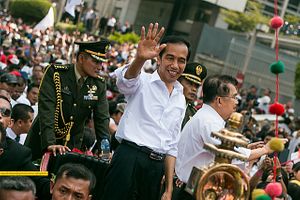Last Sunday pre-election debate between incumbent President Joko “Jokowi” Widodo and challenger Prabowo Subianto failed to set hearts on fire, but it certainly made an impact in the country’s booming social media sphere. Much like the first debate — and presumably like the three to follow — the winner has not been decided by political journalists and academics. The loser, rather, is determined by Indonesia’s infamous netizens who will have a meme viral before a candidate finishes their thought. Or, in the case of the first debate which saw a stoic vice-presidential candidate Ma’ruf Amin go viral over his few words, before a candidate begins thinking.
Which is how Subianto, conveniently frequently photographed riding horses, on the back of a unicorn has become the most memorable image of a debate ostensibly about infrastructure, the environment and agriculture. The slip up came as Jokowi touted the country’s four Unicorns, tech start-ups valued at over $1 billion. Subianto is certainly not alone in being unfamiliar with the term but the hiccup underscores a gulf between the two candidates.
The first half of Jokowi’s term was dominated by a number of key programs, some of them more well-developed than others. Among those in the mix include Industry 4.0 and developing the emerging tech companies sprouting up in Jakarta’s “Slipi-con Valley.” The big four — ride-hailing giant Go-Jek, travel site Traveloka and online market spaces Bukalapak and Tokopedia — have enjoyed the support of the president keen to see the local industry battle it out against rival Asian tech hubs.
Subianto’s stumble is reflective of the focus of his and running-mate Sandiaga Uno’s campaign to date. The pair are far more concerned with the traditional markets and food prices than apps. Uno, in particular, appears at home in neighborhood markets, even though the visits are frequently proving to be a folly. Here is where Subianto struck in the debate, using the opportunity to push for self-sufficiency. “We must stand on our own two feet, we must be self-sufficient in food supply, energy and water supply in order to survive,” he said. This signals a firmly protectionist economic policy, which both candidates will have the chance to outline in the final debate in April.
The exchange also overshadowed the fact that one of Indonesia’s most pressing economic, security and environmental concerns — climate change — was ignored during the one opportunity for it to be discussed. Indonesia is one of the world’s worst climate offenders and also one of the most at risk of its adverse effects. A brief touching on forest fires typically lit to prepare land for the lucrative palm oil trade saw Jokowi deny that under the later years of his presidency fires have occurred — a claim which has since been rebutted by environmental NGOs and the government’s own data.
Infrastructure, an indicator polling shows will sway far more votes than environmental issues, fared much better. Naturally, the incumbent had the upper-hand here laying out the government’s sweeping programs across the archipelago. Subianto seized on the few missteps and roll-out concerns but largely Jokowi does have an impressive record on infrastructure development.
The Subianto-Uno camp appears to be reeling in the aftermath of the debate. Speaking to journalists on Tuesday, campaign deputy Priyo Budi Santoso conceded the team’s candidate was ill-prepared to face-off against Jokowi. “We did not expect [Jokowi] to be this aggressive. We were caught off-guard because we mainly talked about several compelling ideas,” Santoso said. Jokowi, by contrast, came armed with statistics highlighting the government’s record.
For voters, this concession bodes well. With just under two months until the polls open, the election period thus far has been typified as quite dull and lacking in policy ideas. If anything, a well-prepared opposition and an incumbent forced on the defensive can only be a good thing for strengthening voter engagement and education. Whether or not this is the pattern that persists remains to be seen, with several debates remaining out to the election.
































